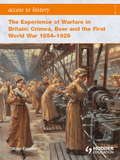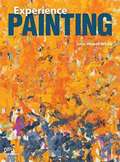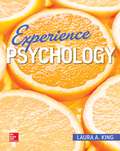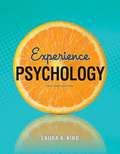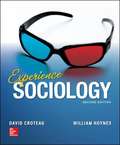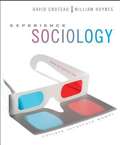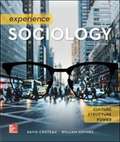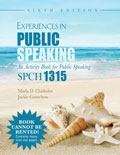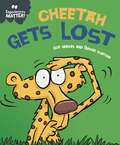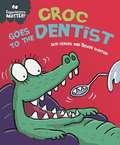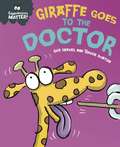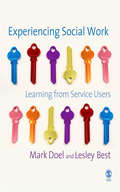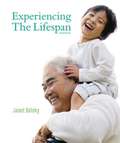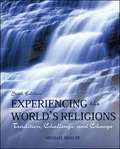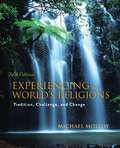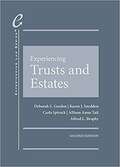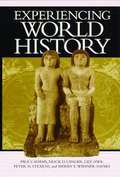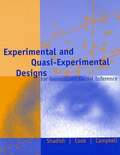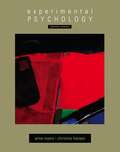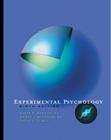- Table View
- List View
The Experience of Warfare in Britain: Crimea, Boer and the First World War 1854-1929 (Access to History)
by Alan FarmerAbout the series: The Access to History series is the most popular and trusted series for advanced level history students, offering: <P><P>Authoritative, engaging and accessible content <Br>Comprehensive coverage of the AS and A level history specifications<BR>Design features, study guides and web support to help students achieve exam success.<P>About the book: <P>This title covers the experience of warfare in Britain and the social and political effects that had in the late nineteenth and early twentieth centuries. It examines major questions such as:<P>What was the impact of the Crimean War?<BR>What was the impact of the Second Boer War?<BR>What was the experience of war on the Western Front?<BR>What was the impact of the First World War on the Home Front?<P>Throughout the book, key dates, terms and issues are highlighted, and historical interpretations of key debates are outlined. Summary diagrams are included to consolidate knowledge and understanding of the period, and exam-style questions and tips written by a senior examiner provide the opportunity to develop exam skills.
Experience Psychology
by Laura KingSome students take psychology...others experience it! Informed by student data, Experience Psychology helps students understand and appreciate psychology as an integrated whole. The personalized, adaptive learning program, thought-provoking examples, and interactive assessments help students see psychology in the world around them and experience it in everyday life.
Experience Psychology (Second Edition)
by Laura KingDo you want your students to just take psychology or to experience psychology? Experience Psychology is a complete learning system that empowers students to personally, critically, and actively experience the impact of psychology in everyday life. Experience Psychology is about, well, experience--our own behaviors; our relationships at home and in our communities, in school and at work; and our interactions in different learning environments. Grounded in meaningful real-world contexts, Experience Psychology's contemporary examples, personalized author notes, and applied exercises speak directly to students, allowing them to engage with psychology and to learn verbally, visually, and experientially--by reading, seeing, and doing. With the Experience Psychology learning system, students do not just "take" psychology but actively experience it.
Experience Science (Kentucky)
by William Badders Douglas Carnine Bobby Jeanpierre James Feliciani Carolyn Sumners Catherine ValentinoNIMAC-sourced textbook
Experience Science (Kentucky)
by William Badders Douglas Carnine Bobby Jeanpierre James Feliciani Carolyn Sumners Catherine ValentinoNIMAC-sourced textbook
Experience Science [Kentucky]
by William Badders Douglas Carnine Bobby Jeanpierre James Feliciani Carolyn Sumners Catherine ValentinoNIMAC-sourced textbook
Experience Sociology
by David Croteau William HoynesExperience Sociology makes the familiar new. Using a unique, contemporary framework of culture-structure-power, students learn to apply sociological concepts through familiar lenses. Paired with a proven, personal, and adaptive learning experience, students move beyond memorization of topics to develop their sociological imagination. Connect is the only integrated learning system that empowers students by continuously adapting to deliver precisely what they need, when they need it, and how they need it, so that your class time is more engaging and effective.
Experience Sociology
by David Croteau William HoynesExperience Sociology empowers students to use the lenses of Culture, Structure, Power to see sociology everywhere. Bringing theory and sociological concepts together, Experience Sociology helps students move beyond an individual perspective to gain a sociological perspective.
Experience Sociology
by William Hoynes David CroteauExperience Sociology has set the new standard for teaching Introductory Sociology. Approaching sociology through the key concepts of culture, structure, and power, the program enables students to see sociology everywhere, and make the familiar new. Presented in an accessible and engaging way that brings theory and sociological concepts together, students move beyond their individual perspective to gain a true sociological perspective. Connect, the proven online experience, adapts to the student’s learning needs, enhancing the understanding of topics and developing their sociological imagination.
Experiences In Public Speaking: An Activity Book for Public Speaking: SPCH 1315 (Sixth Edition)
by Marla D. Chisholm Jackie GanschowExperiences in Public Speaking: An Activity Book for Public Speaking: SPCH 1315 <p><p> Author(s): Marla Chisholm, Jackie Ganschow
Experiences Matter: Cheetah Gets Lost (Experiences Matter)
by Sue GravesCheetah Gets Lost offers a gentle introduction to the experience of getting lost for young children.This funny, charming story is the perfect way to introduce young children to the experience of getting lost. Also included are suggestions for activities and ideas to talk through together to help children reflect on their own experiences.When Cheetah gets lost on a day out with his friends and Uncle Hippo, he must try to keep calm and remember what to do to stay safe and find help.The Experiences Matter series of picture books provide a gentle means of discussing experiences, boosting self-esteem and reinforcing good behaviour. Supports the Personal, Social and Emotional Development Area of Learning in the Early Years Foundation Stage, and is also suitable for use with children in KS1 and can be used to discuss values. Suitable for children under 5.
Experiences Matter: Croc Goes to the Dentist (Experiences Matter)
by Sue GravesCroc Goes to the Dentist offers a gentle introduction to the experience of visiting the dentist for young children.This funny, charming story is the perfect way to introduce young children to the experience of visiting the dentist. Also included are suggestions for activities and ideas to talk through together to help children reflect on their own experiences.Crocodile loves sweet things, but when her teeth start to hurt, she needs to visit the dentist. Crocodile feels nervous, but the dentist is very kind.The Experiences Matter series of picture books provide a gentle means of discussing experiences, boosting self-esteem and reinforcing good behaviour. Supports the Personal, Social and Emotional Development Area of Learning in the Early Years Foundation Stage, and is also suitable for use with children in KS1 and can be used to discuss values. Suitable for children under 5.
Experiences Matter: Giraffe Goes to the Doctor (Experiences Matter)
by Sue GravesGiraffe Goes to the Doctor offers a gentle introduction to the experience of visiting the doctor for young children.This funny, charming story is the perfect way to introduce young children to the experience of visiting the doctor. Also included are suggestions for activities and ideas to talk through together to help children reflect on their own experiences.Giraffe is not feeling well. She has a hot head and a sore throat. Mum says Giraffe will need to visit the doctor. Giraffe feels nervous, but the doctor is very gentle and she is soon feeling better.The Experiences Matter series of picture books provide a gentle means of discussing experiences, boosting self-esteem and reinforcing good behaviour. Supports the Personal, Social and Emotional Development Area of Learning in the Early Years Foundation Stage, and is also suitable for use with children in KS1 and can be used to discuss values. Suitable for children under 5.
Experiencing Heritage
by Mcgraw-Hill CompaniesThe book contains four sections, each of which addresses culture and heritage in a different way. Section one covers language, the many languages spoken in the United States, and the way in which American English has taken in words from other languages. Section two talks about culture in the community and how we can learn about our own heritage and the heritages of people we live near. Sections three and four are stories of children learning about each others' and other people's cultural heritages and exploring their own.
Experiencing Social Work: Learning from Service Users
by Lesley Best Mark Doel'Experiencing Social Work provides a refreshing change in the expanse of social work education texts. Its focus on learning from people who had received a good service from social workers drew out many of the foundation blocks of practice that can so easily be minimised in favour of 'deeper academic theories'. In short, it reminded me of my own passion for practice and the privilege it is to be part of the social work profession' - Kay Wall, Lecturer in Social Work In this book people tell their stories of positive social work and the difference it has made to their lives. The book was inspired by the belief that we can learn more from what goes right than what goes wrong. Follow the stories in each chapter to read about good practice, to reflect on the lessons learned, and to feel uplifted by social work's potential for positive change and social justice. Other key features include: " Case examples from a wide range of service user groups, including people with mental health problems, disabilities, parenting difficulties, those living in care, those experiencing loss and other life transitions. " Commentaries that unpack the core themes and issues from each example in order to understand the experience and learn from it. " Examples of how social work students have contributed to positive change in the lives of service users. " A strong grounding in the ethical guidelines and skills base required of all social work practice. This important book will be valuable reading for all undergraduate social work students and will also be useful for qualified social workers, service users and carers. Mark Doel is based at the Centre for Health and Social Care Research, Sheffield Hallam University. Lesley Best is based at the School of Health, University of Northampton.
Experiencing the Lifespan (Third Edition)
by Janet BelskyWinner of the Textbook Excellence Award from the Text and Academic Authors Association, Janet Belsky’s Experiencing the Lifespan always reflects a scientist’s understanding of key research, a psychologist’s understanding of people, and a teacher’s understanding of students. This extensively updated new edition features significant new findings, a broad-based global perspective, and enhanced media offerings. With all of this, the book itself remains at just the right length and level of coverage to fit comfortably in a single-term course.
Experiencing the World's Religions: Tradition, Challenge, and Change (Sixth Edition)
by Michael MolloyMichael Molloy's multi-dimensional examination of religions, combined with Connect Religion's skills-based activities, provides an intimate learning experience for students. Experiencing the World's Religions integrated program supports today's students and provides skills that extend beyond the Introduction to Religion course, engaging both non-majors and majors in the subject. The goal of the 6th edition is to better meet the Introduction to Religion course challenges of building student engagement, developing critical analysis skills, and building writing skills. The 6th edition of Experiencing the World's Religions continues to include primary sources, current examples, and coverage of women, to ensure students are introduced to unfamiliar religions in ways that are accessible, inviting, and intriguing. Experiencing these concepts and cultures is the hallmark of Michael Molloy's approach. His pedagogy and activities are now fully integrated and assessable within Connect Religion, to make for an increased understanding of the most important and memorable elements of each religion. Writing activities in Connect Religion, tied to chapter narrative, offer students the chance to develop their critical analysis skills and put their informed opinions on religion into writing. The result is greater student engagement and greater course success.
Experiencing the World's Religions (Fifth Edition)
by Michael MolloyExperiencing the World's Religions provides a clear and compelling account of the world's major religious traditions. With an engaging narrative and powerful photographs from around the globe, the text conveys the vitality and richness of the world's religions. It views religion as a living cultural wellspring that not only concerns systems of belief but how those beliefs are expressed in ceremonies, food, clothing, art, architecture, pilgrimage, scripture, and music. The text goes beyond traditional approaches to personally connect students with the traditions discussed. With additional pedagogy, primary source excerpts, expanded discussion of religious controversies, and more, this fifth edition has been thoroughly updated in both content and design to provide students with a better understanding of religion and the world at large.
Experiencing Trusts and Estates (Experiencing Law Series)
by Deborah Gordon Karen Sneddon Carla Spivack Allison Tait Alfred BrophyThis textbook takes a learner-centered and experiential approach to trusts and estates law, which makes it well suited to teaching both online and face-to-face. The opening chapters introduce students to key concepts in intergenerational wealth transfer and planning for incapacity and death. The remainder of the book highlights inheritance law concepts from both a forward-looking (planning/drafting) and backward-looking (litigation) perspective. <p><P> The second edition continues to feature some of the most teachable trusts and estates cases, to focus on issues of gender, race, class, and sexuality, and to offer online student resources. New features of this edition include learning outcomes at the beginning of each chapter to help with ABA compliance and student focus, a broad and varied array of formative assessments, a glossary of terms, highlight boxes containing practice notes, connection notes, and language notes, and final chapter take-aways to link topics together. Some examples of assessments include; role playing exercises; drafting client letters and testamentary instruments; writing policy papers, legislation, and judicial opinions; and preparing community and client presentations. Each chapter also features more traditional hypotheticals, fact patterns, and discussion questions, extensive notes designed to help lead students through the major issues, and an appendix of sample documents.
Experiencing World History
by Paul Vauthier Adams Erick D. Langer Lily Hwa Peter N. Stearns Merry E. Wiesner-HanksCovering early societies, the classical, post classical, and modern periods, and the 20th century, and blending the great advances in historical research over the past quarter century,Experiencing World History represents an important addition to the teaching of world history. Focusing on major issues in social history in the context of world history and divided into five chronological sections that highlight the mixture of change and continuity, the volume traces key aspects of society over time, among them gender; work and leisure; state and society; culture contact and population patterns. Truly global in scope,Experiencing World Historyincludes deep coverage of all the major areas including Asia, Africa, Europe, and the Americas. A brief introduction ties the social history themes to more conventional world history coverage, and an epilogue after each of the five sections suggests overarching themes and connections.
Experimental And Quasi-experimental Designs For Generalized Causal Inference
by Thomas D. Cook Donald T. Campbell William R. ShadishThis long awaited successor of the original Cook/Campbell Quasi-Experimentation: Design and Analysis Issues for Field Settings represents updates in the field over the last two decades. The book covers four major topics in field experimentation.
Experimental Psychology
by Christine H. Hansen Anne MyersFocusing on experimental methods, authors Anne Myers and Christine Hansen lead students step by step through the entire research process, from generating testable hypotheses to writing the research report. The major sections of the book parallel the major sections of a research report (Introduction, Method, Results, and Discussion), giving students the skills they'll need to design and conduct an experiment, analyze and interpret the research findings, and report those findings. Although the main focus is on experimentation, alternative approaches are discussed as important complements.
Experimental Psychology
by Barry H. Kantowitz David G. Elmes Henry L. RoedigerUNDERSTANDING PSYCHOLOGY RESEARCH, Ninth Edition, takes an example-based approach to the fundamentals of research methodology. Organized by topic--such as research in human factors, learning, thinking, and problem solving--the text helps you connect the concepts of sound methodology with their practical applications. Because the authors use dozens of carefully selected real-world examples, you can see for yourself the issues and problems that can occur in conducting research. More importantly, you can develop a sense of how to anticipate and adjust for problems in your own research.
